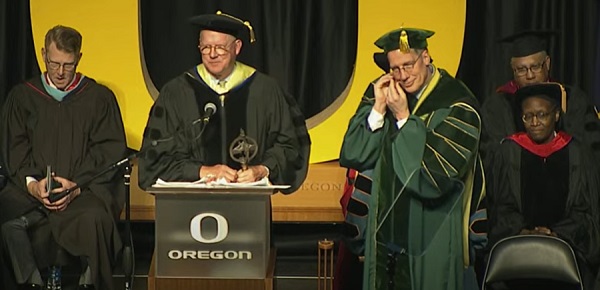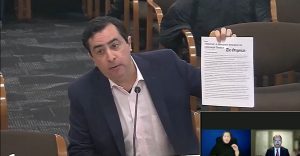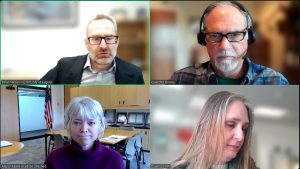UO president criticized for mace comment
6 min read
Students are criticizing an impromptu remark by University of Oregon President Karl Scholz. He made the remark May 30 as his investiture resumed after a 15-minute intermission.
Pro-Palestine protesters began chanting just as the chair of the Board of Trustees was offering the symbols of office.
Steve Holwerda (UO Board of Trustees): It is my pleasure at this time to present for you the official symbols of leadership, the president’s medallion and the university mace.
[00:00:33] John Q: As protesters continued chanting, the live ceremony was paused, and then resumed as a livestream event.
[00:00:40] Karl Scholz (UO president): Let’s go ahead and get started again. (cheering) Thanks. Please, you all are way, way, way too kind. So thank you for your flexibility. Let’s go ahead and get started again.
The interruption actually came at a pretty good time because I think Steve Holwerda was about to hand me a mace. And the mace is pretty heavy, and I can get kind of fired up about things. And so, (laughter) it’s great to see everybody here.
[00:01:30] John Q: In a statement released June 3, the UO Palestine Coalition said: ‘This inappropriate comment has no place on a college campus, particularly coming from someone who is supposed to ensure the safety of their student body, and their First Amendment right to protest.’
[00:01:43] At the Board of Trustees meeting June 4, public comment:
[00:01:48] Jay Steininger: Hello, my name is Jay Steininger. I’m a student at this university and a member of the steering committees of UO YDSA and the UO Palestine Coalition. I’m here today to express my absolute disgust for how President Karl Scholz threatened the physical safety of student protesters at his investiture ceremony last Thursday.
[00:02:06] He claimed that he could get fired up and joked about assaulting students with his presidential mace. This is reprehensible and despite your opinions on the nature of the protest, no university official should say anything like this ever.
[00:02:20] How embarrassing for the university.
[00:02:23] The UO mission statement claims that the university serves to enhance social, cultural, physical, and economic well-being of our students, Oregon, the nation, and the world.
[00:02:32] Can someone explain to me how threatening to assault students enhances the well-being of students, or how sending money to a genocide enhances the well-being of the world?
[00:02:42] I stand behind the demands of the UO for Palestine Coalition. The Board of Trustees must pressure the UO Foundation to disclose its investments and divest from the U.S.-Israeli war machine. It must condemn the genocide and it must boycott Hewlett Packard products. I also encourage President Scholz to make good on the agreement he signed and be as ethical as he claims to be.
[00:03:01] John Q: Later in the June 4 meeting, during his president’s report to the Board of Trustees:
[00:03:08] Karl Scholz (UO president): It’s unfortunate that a small group chose to disrupt the ceremony and keep interested students, faculty, staff, and guests from being able to attend and participate in the entire event. Instead, we had to finish the ceremony with a smaller live audience and livestreamed to others who were there in person. Fortunately, all other activities continued as scheduled…
[00:03:33] I want to thank the many people who helped organize and prepare for the event and keep things running safely and smoothly. So I’d especially like to offer my thanks to Carlyn Shreck, who did a remarkable job planning the investiture.
[00:03:47] We’re at a really challenging period at the UO and across many institutions of higher education. At the heart of this challenge is a distinction between free speech and disruptive behavior. I and our university community cherish free speech and open dialogue. It’s the bedrock of academic inquiry and critical thinking and necessary to foster an environment where diverse perspectives can flourish.
[00:04:17] However, it’s crucial to differentiate between exercising free speech and engaging in actions to disrupt university activity and student experiences. When protesters shut down or delay events or classes, block access to and from buildings, prevent others from speaking or deface property, this crosses the line from speech to behavior that violates codes, rules, and laws.
[00:04:46] We are aware from observation of other campus demonstrations of the potential for outside groups to use university protests as opportunities for unlawful behavior.
[00:04:59] In addition, we recognize this period has been especially painful for some of our Jewish students, colleagues, and parents.
[00:05:07] In that light, and with the help of the university senate and many in our community, I’m grateful that the encampment ended without physical harm to anyone, but some of the encampment participants broke university rules. These rules exist for the safety and well-being of our entire community and apply to all, regardless of any stance on any issue. These rules do not interfere with the exercise of free speech.
[00:05:36] Accordingly, we are taking disciplinary action and will soon issue several code violation letters related to these behaviors.
[00:05:45] As described in the agreement, the university views student cooperation and goodwill in reaching an encampment settlement as a mitigating factor in adjudicating student conduct violations.
[00:05:59] I hoped and expected the agreement that the university reached would mark a shift in tactics where dialogue on these and related issues would move to more constructive spaces, such as with the Senate Task Force and through other means negotiated in the agreement. The disruptive actions Thursday make it clear that some individuals are not honoring the agreement.
[00:06:24] Several people, including members of this board, have expressed their concern to me about the potential that demonstrators may disrupt our graduation celebrations, or continue to disrupt other university activities like classes or finals. This concerns me as well.
[00:06:42] So let me be clear: Students and others who violate codes, rules, or laws through their actions by disrupting events or the regular activities of the university, blocking exits, or engaging in vandalism, will face disciplinary and/or legal action. Our Conduct Office and University Police Department are actively investigating the events of last Thursday and will issue citations and take disciplinary action against those who broke the law or violated policies or the code of conduct.
[00:07:16] The university will also be taking additional measures during commencement, working to protect the experiences of our graduating students and their families and guests.
[00:07:27] Graduation is a precious time at UO and at all universities, a time to celebrate the accomplishments of our students and their proud families. It represents the culmination of their efforts and the next steps toward the lives they envision for themselves. It is particularly so. this year, as many of our students did not get to experience high school graduation due to the pandemic. We will take every measure to safeguard this cherished celebration.
[00:07:57] John Q: President Karl Scholz at the Board of Trustees June 4, stating that the disruption of the investiture violated the agreement between protesters and the administration.
[00:08:07] The students say President Scholz was first to break the agreement, by changing the text of his message to the community May 23. They said the agreed-upon language should have called for ‘an end to military operations’ in Gaza, and should have clearly outlined the devastating loss of Palestinian civilians. Instead, they said, President Scholz erased from his message the words ‘Palestine’ and ‘Palestinians.’
[00:08:29] Graduation events start June 8 and continue through June 17.
Image: Steve Holwerda, holding the University of Oregon mace, pauses as the investiture ceremony is disrupted by pro-Palestine protesters. The UO website notes that in medieval times, a mace was carried into battle by kings, bishops, and other leaders for use as a weapon. Today, it is an official symbol of the president’s authority at the University of Oregon.





